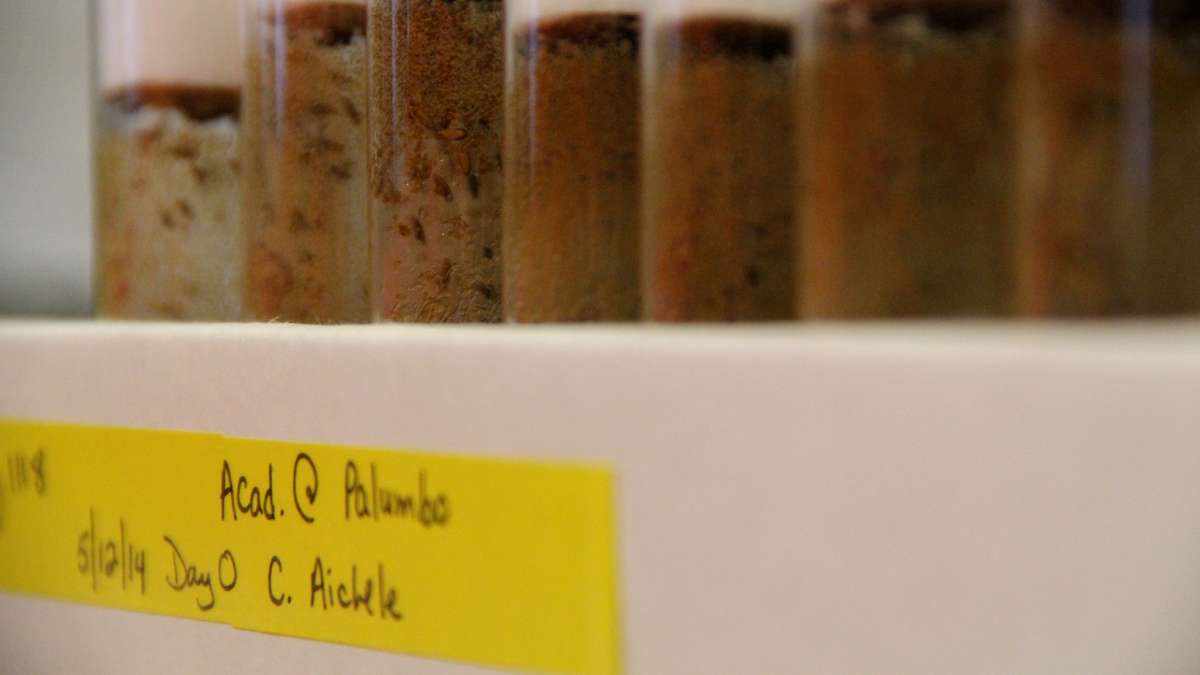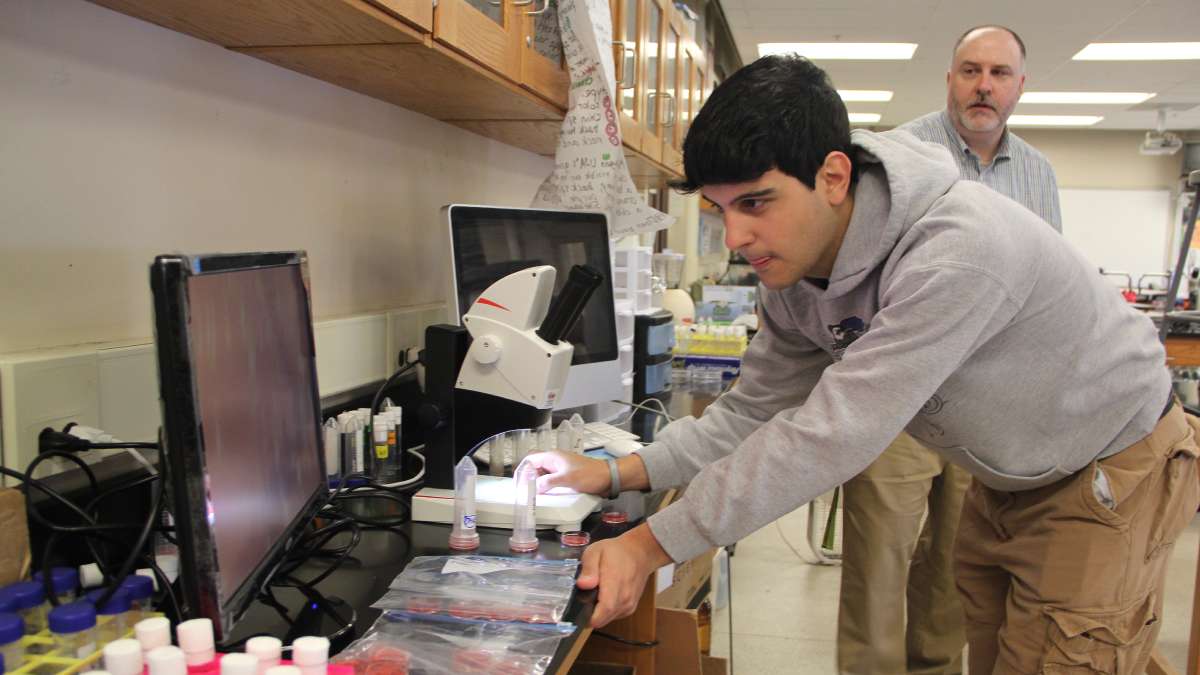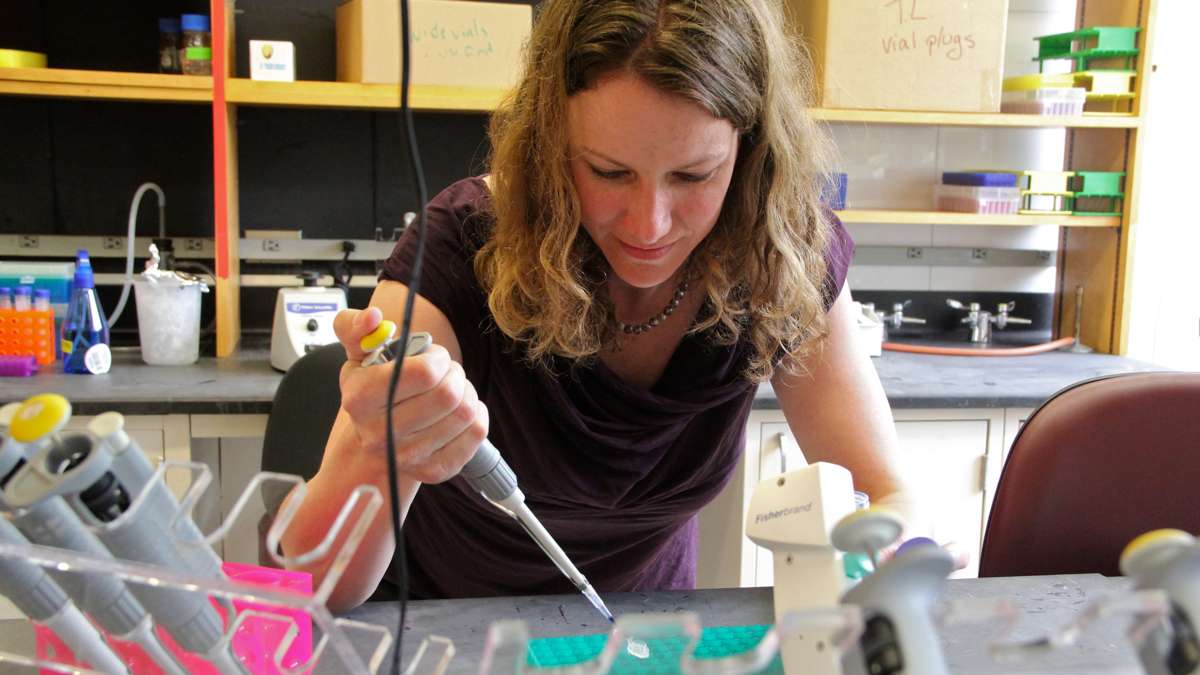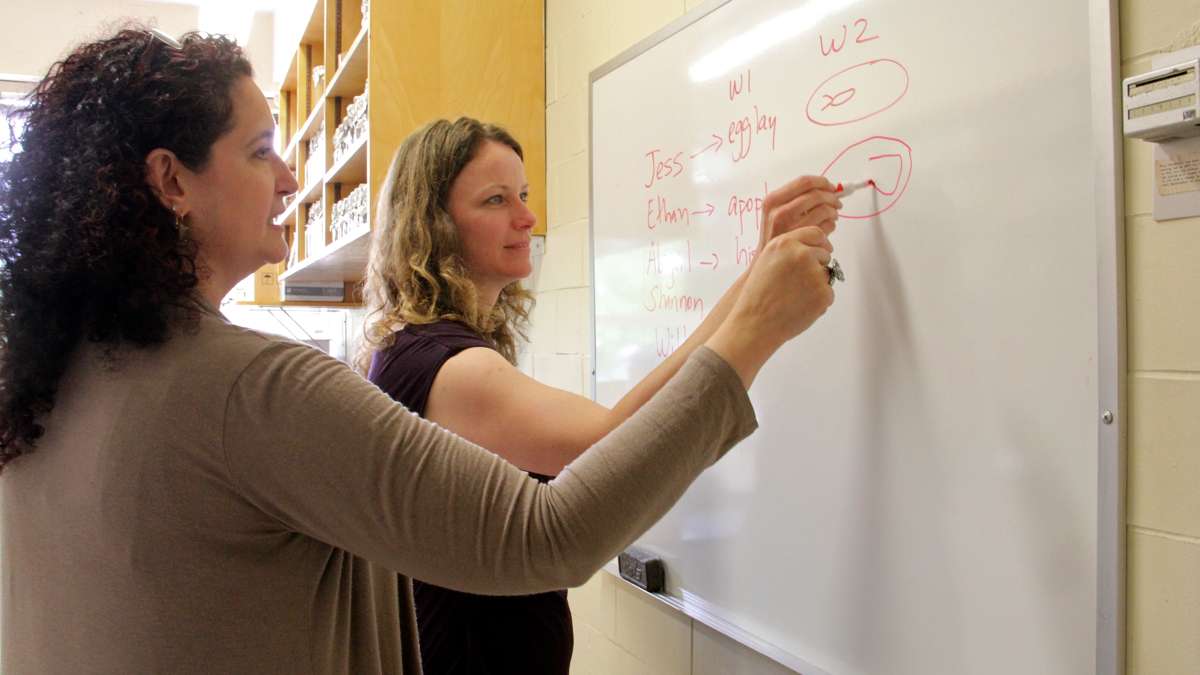Academy at Palumbo students participate in Fox Chase Cancer Center’s first fruit fly foot-locker program
Listen-

-

-

-

-

Academy @ Palumbo senior Ibrahim Bakri gets a close look at his fruit flies using a microscope on loan from Fox Chase Cancer Center. (Emma Lee/for NewsWorks)
-

-

-

-

South Philly’s Ibrahim Bakri’s biology class works to determine how household food items affect fruit fly cell proliferation.
South Philly’s Ibrahim Bakri is a matchmaking pro.
During his senior year at the Academy at Palumbo he learned that mating is simple: get a bunch of girls together with a few guys in a small space and the results are libidinously wild.
“So we just put them in vials, a whole bunch of females, a couple males, and just left them overnight,” he said, “and by the time we came back there were eggs all over the place.”
We’re talking, of course, not of hormonal teenagers, but, of fruit flies.
Bakri’s advanced placement Biology class is the first to take part in Fox Chase Cancer Center’s fruit fly foot-locker program.
Fox Chase provides a foot-locker of top-notch gear to a high school science classroom, and students perform completely novel research that aims to determine how household food items affect fruit fly cell proliferation.
“Things like Cool Ranch Doritos and Monster and cheese puffs,” said Bakri, adding Diet Pepsi to the list, “and we saw how if you introduce those things how they could alter the development of fruit flies.”
On a recent rainy morning at Palumbo, Bakri peered through the sights of a microscope attached to a 20 inch monitor – allowing a huddle of classmates to see his vantage point in real-time. The fruit-fly eggs resemble small reddish-brown periods with tiny antennae. Some of the newly spawned flies crawl around on a purplish jello-y goo called agar.
Bakri’s group infused it with traces of Monster energy drink.
“It caused the population to grow exponentially,” he explained.
The theory here is that conducting these experiments on flies could help scientists better understand how diet can slow or speed cancer cell growth in humans.
“Cancer cells are just normal cells that just keep growing and growing uncontrollably and form tumors,” said Chris Aichele, Palumbo’s AP Biology teacher.
“So what they’re trying to do is they’re trying to find some type of nutrient that prevents the cell from going through its normal cycle and kind of shuts off. So if we can find that, then the potential is that we can actually stop cancer cells from growing.”
Aichele helped develop the foot-locker program after taking a course at Fox Chase, which covers the bulk of its costs. Aichele was able to attract more support by successfully petitioning the Philadelphia Ed Fund to kick-in a $1,000 micro-grant via its partnership Dow Chemical.
To him, the exciting thing about this program is that it’s not just ‘play science.’ The kids’ findings will actually go back to Fox Chase, where they will be checked and compiled along with the center’s larger body of research.
“When you ask high school students: what do you want to be when you grow up? They mostly say, ‘Oh, I want to be a doctor or I want to be a nurse.’ Nobody ever says they want to be a researcher working in a lab,” he said, “but it’s the researchers who are doing all the important things.”
Fox Chase’s Doctor Alana O’Rielly is out to turn that sentiment on its head.
In addition to running her own fruit-fly research lab, O’Reilly oversees Fox Chase’s teaching lab, which hatched the foot-locker program – all part, she says, of finding the next generation of scientists who will help advance the fight against cancer.
“What we’ve learned is that especially students from underprivileged areas tend not to go into science, because it’s so much work and it’s so hard and there’s really no support.”
O’Reilly and her team have been very impressed with what’s happened at Palumbo.
Dara Ruiz-Whalen, the lead instructor at the teaching lab, couldn’t believe the response she received at the school’s career day. Students, she says, skipped other classes to come listen to her presentation.
“You’re hoping one kid is going to get excited, and during career day we had students that were like, “Is this really what you do? You get to do this?’ I’m like, ‘Yeah,'” she said.
“They’re like, “I want to do this. I want to figure this out. I want to cure cancer.’ And it’s a big statement for a sixteen year old to make, but, hey, if you can get a sixteen year old to say, ‘I’m going to cure cancer,’ ok, great, let’s see what we can do to help you get there.”
At Palumbo, as students scrambled to put together end-of-year PowerPoint presentations of their research, the district’s larger budget crisis loomed in the air like the harsh and pungent stench of fruit flies warming in an incubator.
Like in all Philly public schools this year, students at Palumbo watched budget cuts strip their school’s resources to skeletal levels.
The fruit fly program is but one example of how private philanthropy has attempted to band-aid over the district’s larger fiscal constraints.
Ibrahim Bakri, who will head to The University of Pennsylvania in the Fall, feels grateful to have had the opportunity to receive, at least for a short while, the type of world-class education that other students take for granted.
“I think that, you know, we’re trying to succeed in spite of what’s happening around us,” he said. “And I think we will because we’ve been exposed to things that are a little bit bigger than ourselves, and exposed to things that we never would have thought of.”
WHYY is your source for fact-based, in-depth journalism and information. As a nonprofit organization, we rely on financial support from readers like you. Please give today.




